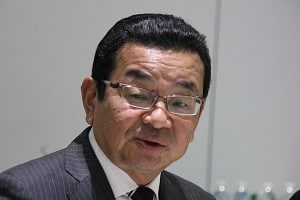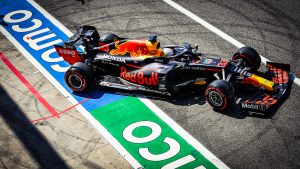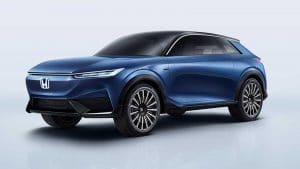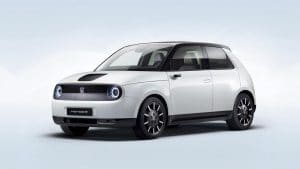
Honda will pull out of Formula One racing at the end of next year, a move it says is necessary to free up funding for what is becoming a very costly effort to develop competitive zero-emissions vehicles.
The third-largest Japanese automaker isn’t alone in shifting resources in order to focus on EV development. Volkswagen is believed to be looking at the sale or spinoff of three of its many brands for much the same reason.
Like the rest of the auto industry, Honda has been hit hard by the events of a turbulent year but, in an online news conference, CEO Takahiro Hachigo said the decision to pull out of the F1 World Championship series “is not a result of the coronavirus pandemic but because of our longer-term carbon-free goal.”
(Honda brings E:Concept SUV to Beijing Motor Show.)

Honda has said that it wants to have fully two-thirds of its global sales come from vehicles using alternative power technologies by 2030. This includes conventional hybrids, plug-in hybrids, pure battery-electric vehicles and products powered by hydrogen fuel cells.
Until recently, the automaker had downplayed BEVs, much like its bigger rival Toyota. But Honda has begun rethinking the mix of products it will need to develop, partly due to slowly growing consumer acceptance of all-electric vehicles and partly because of improving technology. But there is also the issue of government emissions and mileage mandates.
More than 20 countries have now either set target dates for banning the sale of vehicles powered by internal combustion engines or are in the process of formalizing such mandates. UK leaders have begun debating whether to pull forward their mandate from 2040 to 2030. Dozens of other cities and regions are enacting similar bans, California’s Governor Gavin Newsom last month signing an executive order to go into effect in 2035.

Developing BEVs is extremely costly. Automakers are dealing with that challenge in a variety of ways. VW for example, said last year it expects to invest at least $66 billion in its program. As TheDetroitBureau.com yesterday reported, the German carmaker is considering shedding three brands, Bugatti, Ducati and Lamborghini, to help raise funds and shift resources.
(General Motors, Honda strengthen existing partnership.)
For its part, Honda has formed a series of joint ventures with erstwhile rival General Motors to develop both fuel-cell and battery technologies. Most recently, GM agreed to provide two future BEVs to Honda based on its own new Ultium electric vehicle platform and batteries. But Honda feels it needs to free up even more resources, it said in a statement today.
“Honda needs to funnel its corporate resources in research and development into the areas of future power unit and energy technologies, including fuel cell vehicle (FCV) and battery EV (BEV) technologies, which will be the core of carbon-free technologies,” according to the statement.

The carmaker has been involved in Formula One on and off since 1964. After some years out of the series it returned in 2015, and partnered with the powerhouse Red Bull Racing team.
“We understand how difficult it has been for Honda Motor Co. to reach the decision. We understand and respect the reasoning behind this,” Red Bull Team Principal Christian Horner said in a statement.
While Honda now offers a number of hybrids and PHEVs, it is only now launching its first long-range battery-electric vehicle, the Honda e going on sale in Europe and other select markets. It also revealed the larger Honda E:Concept during the Beijing Motor Show this week.
(Honda offering optional camera sideview mirrors on new e urban hatchback in Europe.)
One question that is generating buzz in the wake of Honda’s F1 pullout is whether the automaker might now choose to participate in Formula E, the race series aiming to position itself as the battery-electric counterpart to Formula One. The series has been growing rapidly and now counts a number of major automakers among its players, including Nissan, Porsche and Mercedes-Benz.







